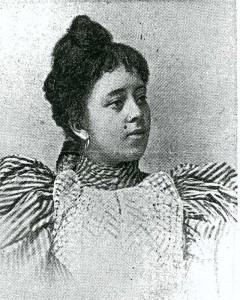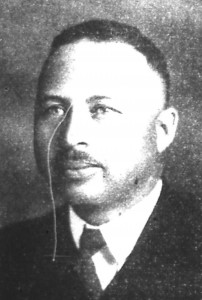The Lytles of Tennessee Town
This April marks the 150th anniversary of the end of the American Civil War. This post is the final of four which highlight ties between Topeka and Shawnee County and national movements during and after the Civil War.
The Exoduster boom that followed the Civil War created a lasting change upon the demographics of Topeka and Shawnee County. By 1880 the number of African Americans residing in Topeka was 3,648, out of a total population of 15, 528. This reflects a 404% increase in the African American settlement of Topeka in a period of just five years. Most of the newcomers settled throughout the city's five wards. The community of Exodusters in the 3rd ward became known as Tennessee Town, in recognition of the state where a majority of the initial inhabitants originated.
Some of the early residents of Tennessee Town were the Lytle family. John and Mary Ann "Mollie" Lytle were both former slaves who had moved from Tennessee to Topeka with their young family in 1882. John established a respected barbershop near downtown Topeka and successfully ran for assistant city jailer in 1896. His children would all become accomplished in their fields, and the careers of his daughter, Lutie, and his son, Charles, are worth mentioning.
Lutie was no older than eight when the Lytles moved from Murfreesboro, Tennessee to Topeka. Attending local schools through her graduation from Topeka High, Lutie became interested in pursuing a law degree while she worked as a journalist. After teaching in Chatanooga, TN for two years she used her savings to enroll in the law program at Central Tennessee College (CTC) in 1895. At the time, CTC was a relatively new university, established by northern benefactors expressly for the teaching of freedmen and their families. Lutie excelled in her studies and graduated with high honors in 1897. Following her graduation from CTC she was admitted to the Tennessee state bar. This accomplishment was significant, as she was the first black woman admitted to the bar in that state which, at the time, excluded African Americans from even serving on a jury.
Lutie soon moved back to Topeka and became the first African-American woman in Kansas to pass the state bar. Her initial intention was to set up a temporary law office but soon realized relocating to a different community would afford more opportunity (at the time Topeka was already home to seven African-American male attorneys, and a female attorney was viewed as a novelty). When asked by the local newspaper of her intended specialty, Lutie replied, "I like constitutional law because the anchor of my race is grounded in the Constitution, and whenever our privileges are taken away from us or curtailed, we must point to the Constitution as the Christian does the Bible."
After a period of giving lectures on domestic law Lutie accepted a faculty position at her alma mater, CTC. She was the first woman in the United States to teach in a chartered law school. In 1907 Lutie married Alfred Cowan, a prominent attorney experienced in desegregation law. The couple relocated to Brooklyn, New York and in 1913 Lutie and her husband attended the annual convention for what is now known as the National Bar Association. As such, she was the first female participant in such a national organization to attend on equal footing with her husband. Mr. Cowan unexpectedly died in 1913 and Lutie successfully argued at least one of his remaining legal cases after his passing.
In 1916 a widowed Lutie married Reverend Stephen McNeill, a presiding elder in the African Methodist Episcopal Church. Over the next decade the couple would live in a variety of locations in the northeast, including Harrisburg, Pennsylvania. In 1925 she return to Topeka for public appearances and praised the teachings of Marcus Garvey, a prominent figure in the Black Nationalist movement. By the early 1930s they were back in Brooklyn and Lutie was most commonly referred to by her professional name, Lutie Lytle-Cowan. Rev. McNeill passed away suddenly in 1934.
Although she acquired fame for her pioneering role in law, the last two decades of Lutie's life are clouded in obscurity and few details are available. She died, most likely, between 1940 and 1950.
While Lutie Lytle never had children of her own, she did have a namesake in her niece, the young daughter of her brother Charles. Charles was an infant when the family relocated to Topeka. He initially followed in his father's footsteps as a barber, but was urged by his physician to seek a more physically-demanding occupation. In 1904 he became a Deputy Marshal of the Court of Topeka a position he held for 12 years. From there his career expanded to include positions as a Deputy Sheriff of Shawnee County, Deputy State Fire Marshal, and a detective with the Topeka Police (including two years as Chief of Detectives).
Charles was a charismatic man and became a favorite, well-respected Topeka personality after a hunch resulted in a multi-state chase to apprehend a criminal. A 1940 Topeka Capitol article reported the strength of his detective method "...consists in a rare analytical gift for understanding human nature which enables him to establish proper leads and to procure confessions with an irresistible psychological approach."
After his retirement in 1947 Charles opened a drug store at 112 E. 4th, across the street from his
barbershop (which had remained in operation during his service career). Over the next two decades he split his time between traveling and managing the popular store, which was closed and bulldozed in 1963 as part of an urban renewal project. Afterwards, Charles and his wife moved to California to be closer to their son. Charles Lytle died in 1969.
Want to learn more about Topeka history? Newspaper articles and correspondences with Lutie Lytle can be found on microfilm in the Topeka Room as well as in Popular Genealogy Tools. An obituary for Charles Lytle and other prominent Topekans can be acquired the library's obituary search service.















